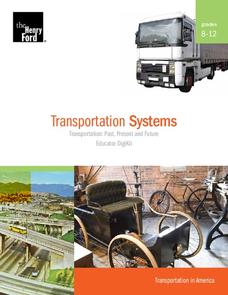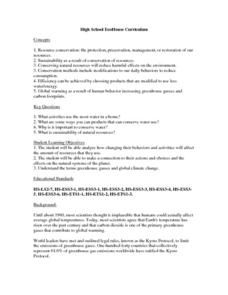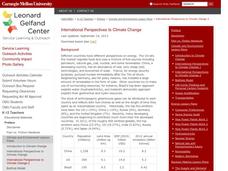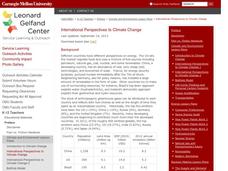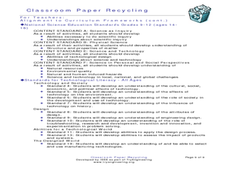Safe Drinking Water Foundation
Make Your Own Water Pollution
Using the polluted water that was made in the prior lesson, your young environmentalists will mix pollutants together in an experiment. Then, they will design a water filter that will clean the polluted water to use in the next lesson....
Safe Drinking Water Foundation
Types of Water Pollution
In groups, young environmentalists investigate water samples that are contaminated with different types of pollutants. Each group presents their findings to the class and fills out the "Types of Pollutants Chart." This lesson is meant...
Safe Drinking Water Foundation
Water Pollution
An introductory lesson to a unit on water pollution, young environmentalists are asked to brainstorm examples of pollutants in water. This lesson will help develop a sense of what water pollution is and where the pollutants come from.
Safe Drinking Water Foundation
Ask an Engineer
A wrap-up to the unit, young environmentalists discuss and write about the difference in perspectives of a water keeper and water treatment engineer.
Earth Day Network
Staying Green While Being Clean
Clean up the environment with a lesson that focuses on replacing hazardous cleaning supplies with green, environmentally-friendly products. Using a dirty patch of surface as a control area, kids clean other parts of various surfaces...
Henry Ford Museum
Transportation Systems
Learners analyze the evolution of cultural attitudes through the lens of transportation, examining several artifacts, documents, and photographs. Topics covered include how American attitudes have influenced society's evolution into a...
National Science Teachers Association
The Ethanol Project
In a mock senate hearing regarding the development of ethanol as a fuel source, each person in the class is assigned a role to play and must uphold the stance of their character. Once the senate hearing is complete, each person writes a...
Texas State Energy Conservation Office
Investigation: Making a PV Cell
Rise and shine! Class members collaborate to construct a photovoltaic solar cell with two semiconductor layers, as guided by this fabulous lab sheet. They test its output with an ammeter or galvanometer.
Curated OER
High School EcoHouse Curriculum
How has the level of carbon dioxide changed over recent years, and what is contributing it? Groups work together to research and present their findings in a creative way. Also built into the lesson is a visit to a sustainable house, but...
Environmental Protection Agency (EPA)
How Much Water Do You Use?
Incorporate reading strategies, math, research, and the scientific method into one lesson about water conservation. After reading a story about a landlady trying to determine how many people are living in an apartment, learners develop a...
Carnegie Mellon University
Understanding Electricity Mix Tradeoffs
Use the accompanying presentation and colorful technology sheets to introduce your class to the 10 different energy technologies. Connect kids to an interactive computer tool that allows them to combine different types of power...
Consortium for Ocean Science Exploration and Engagement (COSEE)
Carbon Dioxide & Krill: Impacts
What effects do temperature and carbon dioxide levels have on the zooplankton of Antarctica? This concluding lesson plan in a short unit on climate change and the ocean helps environmental scientists answer these questions. After...
Consortium for Ocean Science Exploration and Engagement (COSEE)
Ocean Acidification: Whats and Hows
Open this lesson by demonstrating the production of acidic carbon dioxide gas by activated yeast. Emerging ecologists then experiment with seashells to discover the effect of ocean acidification on shelled marine organisms. They measure...
Scholastic
Science Method Printables
Six color posters are included, one for each step of the scientific method. Each step in the process is named, and three points to remember or questions to ask are also included to stimulate thinking.
Carnegie Mellon University
International Perspectives to Climate Change 2
A couple PowerPoint presentations are used to stimulate discussion about the perspectives of different countries on the issue of energy consumption. Afterward, they play a game in which each team is assigned a country, considers its...
Carnegie Mellon University
International Perspectives to Climate Change 1
After a lecture about how the first industrial revolution triggered the path to climate change, your environmental studies class discusses what the impacts are. In a culminating activity, they get into groups and identify countries on a...
Consortium for Ocean Science Exploration and Engagement (COSEE)
Plankton to Penguins: Antarctic Food Web
A well-written lesson plan, second in a series of four, gets high schoolers exploring how the Antarctic food web is impacted by climate change and the associated melting of polar ice sheets. It begins with a PowerPoint presentation about...
Institute of Electrical and Electronics Engineers
Classroom Paper Recycling
After reading about the history and recycling of paper, creative crafters collaborate to think of a new process for making recycled paper. A complete teacher's guide and student worksheets are included. There is no written procedure for...
Institute of Electrical and Electronics Engineers
Working with Watermills
In collaborative groups, emerging engineers or environmental scientists plan and construct a water wheel or watermill that rotates for a total of three minutes. Everything you need to carry out this lesson is included: objectives,...
California Academy of Science
Coral and Chemistry
Using cabbage juice as a pH indicator, future scientists explore the effect of increasing carbon dioxide on the pH of the ocean and relate it to the health of coral reefs. Ideal for an earth or environmental sciences course, this lesson...
Center Science Education
Model a Moving Glacier
Glaciologists in your class make models of glaciers to simulate how they move down a valley, and then they use it to test any aspect of glacier movement. Not only is this a vivid visual of how these monsters of ice flow, but it is also...
Center Science Education
CO2: How Much Do You Spew?
Split your earth science or environmental studies class into groups and give each a scenario card. Scenario cards describe the lifestyles of 10 different fictitious families, focusing on their energy usage. Carbon dioxide emissions are...
Center Science Education
Feeling the Heat
What is an urban heat island? Middle school meteorologists find out by comparing temperatures at different locations on campus. They relate their findings to what might be happening in a concrete jungle and how it impacts local weather....
Center Science Education
Investigating the Climate
What do graphs of atmospheric gases over time show us? Do they indicate that carbon sources and carbon sinks are not in balance? Up-and-coming meteorologists watch video clips, read information, and analyze data from the HIPPO (HIAPER...







